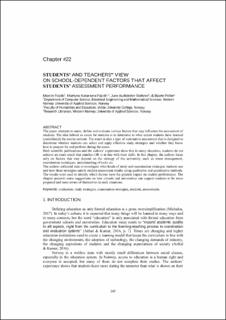Students' and teachers' view on school-dependent factors that affect students' assessment performance
Peer reviewed, Journal article
Published version

Åpne
Permanent lenke
https://hdl.handle.net/11250/2735103Utgivelsesdato
2020Metadata
Vis full innførselSamlinger
Originalversjon
Fojcik, M., Fojcik, M. K., Stafsnes, J. A., & Pollen, B. (2020). Students' and teachers' view on school-dependent factors that affect students' assessment performance. In M. Carmo (Ed.), Education applications & developments V (pp. 245-256). InScience Press.Sammendrag
The paper attempts to name, define and evaluate various factors that may influence the assessment of students. The idea behind an exam for students is to determine to what extent students have learned (assimilated) the course content. The exam is also a type of summative assessment that is designed to determine whether students can select and apply effective study strategies and whether they know how to prepare for and perform during the exam.
Both scientific publications and the authors’ experience show that in many situations, students do not achieve an exam result that matches OR is in line with their skills. In this chapter, the authors focus only on factors that may depend on the strategy of the university, such as stress management, examination techniques, understanding of tasks etc.
The authors collected data to investigate what kinds of study and examination strategies students use and how these strategies satisfy student assessment results using qualitative and quantitative methods. The results were used to identity which factors have the greatest impact on student performance. The chapter presents some suggestions on how schools and universities can support students to be more prepared and more aware of themselves in such situations.
Beskrivelse
This work is under inScience Press Open Access License. This publication may be read, downloaded, printed, copied, distributed, displayed, reproduced and performed, but only for non-commercial purposes, provided acknowledgement of the original source and its author(s) is made, with a link to inScience Press. http://insciencepress.org/